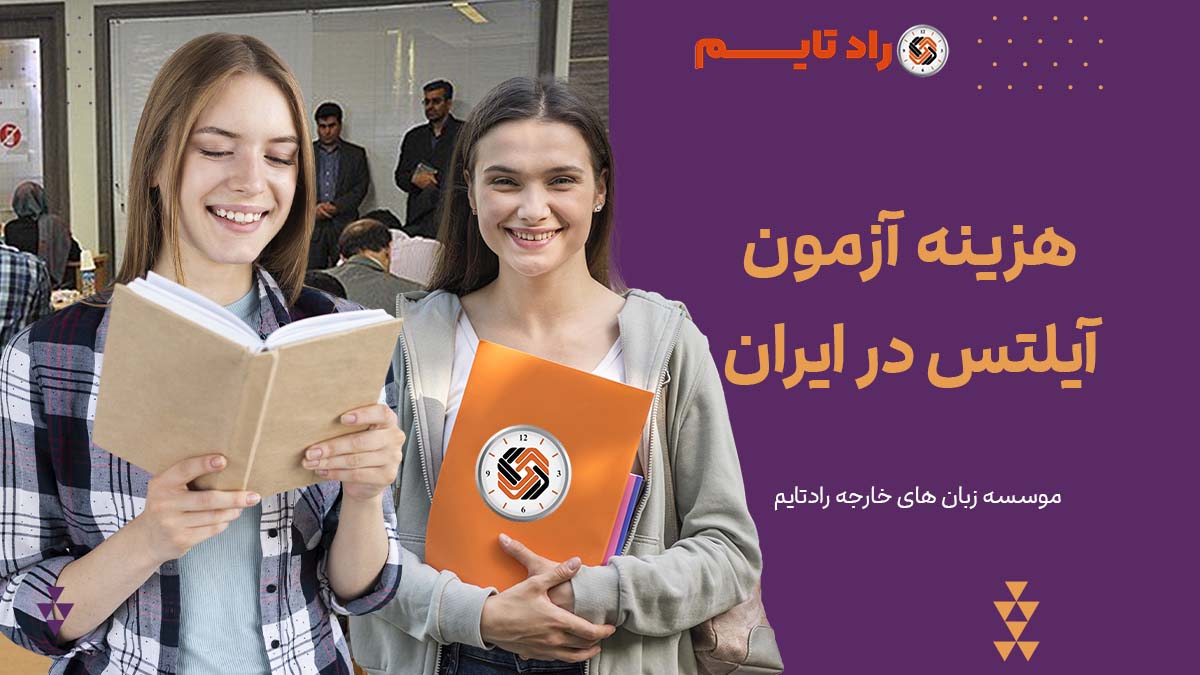حرف اضافه preposition در آیلتس

یک از بزرگترین نقطه ضعف ها و منابع از دست دادن نمره در آیلتس و زبان عمومی حرف اضافه و یا preposition است. حروف اضافه کلمات کوچکی هستند مانند on, at, in که عموماً پیش از اسامی یا افعال جراند (gerund) قرار می گیرند . در این آموزش از سری آموزشهای گرامر برای آیلتس آموزشگاه زبان رادتایم به بررسی و آموزش اجمالی این موضوع بسیار مهم می پردازیم.
انتخاب حرف اضافه در یک جمله اغلب به صفت، فعل یا اسم قبل از آن بستگی دارد.
فعل + حرف اضافه
| فعل | حرف اضافه |
| care, complain, hear, know, learn, say something, talk, think, warn, wonder, worry, write | about |
| aim, fire, laugh, look, point, shout, yell | at |
| choose, decide, differentiate, distinguish | between |
| aim, apologise, apply, forgive, hope, long, prepare, search, wait, watch, wish | for |
| learn, prevent, stop | from |
| assure, convince | of |
| concentrate, count, depend, insist, rely | on |
| apologise, explain, present, speak, talk, write | to |
| be, deal, go out, play, stay | with |
همراه با فعل marry از حرف اضافه استفاده نمی شود.
She married him last year. (not She married with him)
افعالی که مضمون گفتاری یا فکری دارند complain, know, learn, say something, talk, think, warn somebody, wonder, write زمانی که می خواهیم موضوعی را نشان دهیم اغلب با about می آیند:
That way you can learn about teaching before being asked to do it.
برخی دیگر از افعالی که مضمون گفتاری یا فکری دارند مانند: discuss, debate, consider, mention نیازی به حرف اضافه preposition ندارند.
We need to discuss the problem. (not discuss about)
برخی افعال گفتاری مانند apologise, explain, present, speak, talk, write اغلب با to + یک فرد، برای نشان دادن اینکه سخنرانی درمورد چه کسی است، می آیند.
Have you talked to anyone who has done this course?
ما از at + یک شخص یا یک چیز بعد افعالی از قبیل aim, fire, laugh, look, point, shout, yell برای نمایش این که تمرکز فعل برروی چه چیزی یا چه کسی است استفاده می کنیم.
If they shout at me in class, I’m not sure what I’ll do.
ما اغلب برای توضیح ومعرفی چیزی که می خواهیم بعد از افعالی که مُبَین اشتیاق هستند مانند : aim, hope, long, wish از for استفاده می نماییم.
I’m aiming for a good mark in my next assignment.
اگر افعال hope ، aim و long همراه با یک فعل بیایند باید از to به عنوان preposition استفاده نماییم:
I’m hoping to get a better mark than last year.
صفت + حرف اضافه
| صفت | حرف اضافه |
| anxious, annoyed, concerned, depressed, excited, upset, worried | about |
| amazed, annoyed, astonished, awful, bad, clever, excited, good, skilled, surprised, terrible, useless | at |
| amazed, annoyed, astonished, concerned, disturbed, excited, impressed, inspired, shocked, surprised | by |
| bad, concerned, good, responsible | for |
| disappointed, interested | in |
| frightened, scared, terrified | of |
| aware, clever, cruel, generous, good, kind, mean, nasty, nice, polite, rude, selfish, true, typical, unkind | of |
| cruel, good, kind, mean, nasty, nice, polite, rude, unkind | to |
| annoyed, bored, concerned, disappointed, fed up, impressed, obsessed, pleased, satisfied, wrong | with |
صفاتی مانند awful, bad, clever, good, skilled, terrible, useless ، که از توانایی سخن می گویند اغلب همراه با at می آیند:
I’m not very good at maths.
برخی از صفاتی که توصیف گر ترس هستند مانند . frightened, scared, terrified می توانند همراه با of استفاده شوند:
. There are some aspects of the course that I am a bit scared of
Most people are frightened of being in front of a class for the first time.
صفات توصیف کننده رفتار مانند clever, generous, good, kind, nice, selfish وقتی در ابتدای جمله it, that یا this بیاید ، اغلب همراه با of خواهد بود:
Would you like a cup of tea of coffee? That’s very kind of you.
صفاتی که مبین رفتار دیگران هستند مانند cruel, good, kind, mean, nasty, nice, polite, rude, unkind اغلب همراه با to می آیند:
I’m worried about the pupils being rude to me.
اسم + حرف اضافه (preposition)
| اسم (noun) | حرف اضافه |
| anything, information, nothing, something | about |
| excuse, explanation, ideas, in return, need, reasons, reputation, responsibility | for |
| change, decrease, drop, experience, fall, increase, rise | in |
| experience, knowledge, understanding | of |
| effect, impact, influence | on |
| in association, experience | with |
عبارات اضافی یا Prepositional phrases
موارد اسفاده از by
1- برای صحبت کردن درباره کسی که در passive clause هست:
But you will be taught how to deal with those things by the tutors on the course.
2- برای توضیح چگونگی انجام شدن چیزی:
You can remove any dirty marks by wiping it with a wet cloth.
3- برای صحبت کردن درمورد جابجایی و ارتباطات (با هواپیما و ایمیل) :
We’ll be in touch by email soon if that’s okay.
4- برای صحبت کردن در مورد یک چیز اتفاقی یا شانسی (by chance, by accident, by mistake):
I saw the advertisement for the job by chance and decided to apply for it.
موارد استفاده از in
ما در اصطلاحات مانند : in love, in pain, in private, in touch, in debt, in danger, in a rush, in fashion, in luck, in the end از in استفاده می نماییم.
Don’t forget to keep in touch while you’re away!
موارد استفاده از at
1- ما در اصطلاحات at first, at large, at peace از at استفاده می نماییم:
At first I was impressed by the reputation of the university but I also like the course you offer.
2- همچنین در اصطلاحات at work, at home, at school, at the airport, at university از at استفاده می نماییم:
I’ve just finished my first degree at Stamford University.
موارد استفاده از on
ما برای اینکه بگوییم چرا کسی جایی رفته است استفاده می کنیم : on holiday, on business, on duty
موارد اسفاده از of
ما همراه of از اصطلاحات مبین مقدار و یا تعداد استفاده می نماییم : all, any, both, either, neither
نکات مهم گرامری حرف اضافه preposition
1- ما می توانیم بعد از یک حرف اضافه، از اسامی، ضمایر و یا ing استفاده نماییم.
I was really impressed with the description of the course in your prospectus.
If they shout at me in class, I’m not sure what I’ll do.
Well, I’ve always been interested in teaching.
نکته: در حالت منفی not بین حرف اضافه و ing قرار می گیرد.
I’m worried about not being able to control a class.
منابع:
یک از بزرگترین نقطه ضعف ها و منابع از دست دادن نمره در آیلتس و زبان عمومی حرف اضافه و یا preposition است. حروف اضافه کلمات کوچکی هستند مانند on, at, in که عموماً پیش از اسامی یا افعال جراند (gerund) قرار می گیرند .
ما معمولاً از حروف اضافه برای نشان دادن یک رابطه در مکان یا زمان یا یک رابطه منطقی بین دو یا چند نفر، مکان یا چیز استفاده می کنیم.







دیدگاهتان را بنویسید